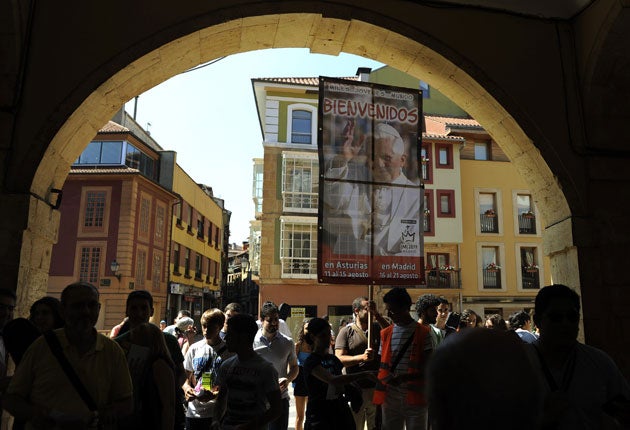Madrileños up in arms at cost of Pope's visit

Your support helps us to tell the story
From reproductive rights to climate change to Big Tech, The Independent is on the ground when the story is developing. Whether it's investigating the financials of Elon Musk's pro-Trump PAC or producing our latest documentary, 'The A Word', which shines a light on the American women fighting for reproductive rights, we know how important it is to parse out the facts from the messaging.
At such a critical moment in US history, we need reporters on the ground. Your donation allows us to keep sending journalists to speak to both sides of the story.
The Independent is trusted by Americans across the entire political spectrum. And unlike many other quality news outlets, we choose not to lock Americans out of our reporting and analysis with paywalls. We believe quality journalism should be available to everyone, paid for by those who can afford it.
Your support makes all the difference.Preparations in Madrid for the impending visit of Pope Benedict XVI have been marred by protests among locals at the vast sums of money being spent on the event.
The Pope's visit this week might be expected to meet with universal acclaim in a traditionally Catholic country. But with half a million pilgrims expected in Madrid, many are angry at the use of public funding and tax breaks to help finance a religious celebration during an economic crisis. While the authorities have been reluctant to release the figures, some estimate the activities could cost between €50m and €100m.
Thousands are expected to march throughout the city centre on Wednesday night against the alleged violation of the separation of church and state. Their slogan is, "To the Pope, from my taxes, zero".
The group Secular Europe, which has accumulated 65,000 signatures denouncing the Pope's visit, issued a statement saying that "So much generosity toward the Catholic hierarchy contradicts the difficult restrictions to public spending and social programmes which everyone is suffering from during the economic crisis."
Spain is mired in a three-year recession without any sign of improvement. The government has reduced public salaries, cut benefits, and raised sales taxes. The unemployment rate is 21 per cent, more than double the European Union average, according to Eurostat.
"I am going to the protest because we shouldn't be financing a private event with public money," said Jorge de Torres, a historian from Madrid. "I'm not against the Pope's visit. But the Vatican should pay its own way."
Even some priests took issue with the financial aspects of this week's activities. The Forum of Madrid Priests, a group of 120 clergymen who work in some of the region's poorest areas, published a letter on their website echoing the protesters' sentiments, especially concerning the tax breaks for sponsors.
"The economic cost is very high, more so in times of crisis," the priests wrote. "In organising the event, it has been necessary to make agreements with political and economic forces which reinforce the image of the Church as a privileged institution... It is scandalous to compare the ease with which the government has financed this event with the economic and social cuts the majority of citizens has had to endure."
Other sources of friction involve the cordoning off of the capital's central streets, and discounts for public transportation offered to accredited pilgrims. For example, the 3-day and 7-day ticket that covers the regional metro, train and bus will cost 80 per cent less than the normal price. This comes a fortnight after the regional government increased the cost of a single ride 50 per cent. Spain has seen its religious demographic wane over the years. According to a recent survey conducted by the Centre for Sociological Research, the number of regular churchgoers was 14 per cent, down from 19 per cent almost 10 years ago.
Join our commenting forum
Join thought-provoking conversations, follow other Independent readers and see their replies
Comments